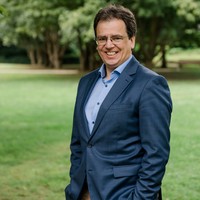Journal Articles by Joseph T . Cochran
Bulletin of Ecclesial Theology, 2022
Through his intriguing “mash-up” of the thoughts and practices of philosophical- theologian Jonat... more Through his intriguing “mash-up” of the thoughts and practices of philosophical- theologian Jonathan Edwards and the philosophical-psychologist William James, Joseph Cochran argues that both approaches offer useful material for mimesis in order to foster virtue.
Jonathan Edwards Studies, 2021
Lisanne Winslow invites readers into a world of wonder and design as she meticulously recounts th... more Lisanne Winslow invites readers into a world of wonder and design as she meticulously recounts the significance of Jonathan Edwards's natural theology. Though the biblical typology of Edwards has experienced extensive study, Winslow fills a lacuna by providing an account of his natural typology. This Congregationalist minister and biologist/theologian from the University of Northwestern, St. Paul fuses the disciplines of philosophy, practical theology, and science into cooperation, arguing that Edwards employed ontologically real types from nature to demonstrate how God embedded spiritual truth about his nature and work in creation in order to glorify himself.

Jonathan Edwards Studies, 2023
This article highlights one of the products of Edwards's knowledge creation, the notion of harmon... more This article highlights one of the products of Edwards's knowledge creation, the notion of harmony. He defines the notion of harmony and encodes it as a significant term in his philosophical-theology early on in his studies. He situated this term within both his natural and metaphysical philosophical-theology. The idea of harmony has received scant attention in the secondary literature on the philosophical-theology of Jonathan Edwards. This article argues that Edwards harnessed the notion of harmony as a key component for synthesizing the sensible perceptions of the world, both natural and metaphysical. Section one of this article examines how Edwards developed his understanding of harmony in the natural world. This section explores the notion of harmony found in his earliest commonplace notebooks kept by him in college. The second section of this article explores Edwards’ metaphysical understanding of harmony by examining his use of the notion in various early “Miscellanies” and his publication, Religious Affections.
Fides et Historia, 2021
A review essay of the Oxford Handbook of Jonathan Edwards.
Bulletin of Ecclesial Theology, 2020
This essay introduces new horizons of study in the realms of technology
and science. It suggests ... more This essay introduces new horizons of study in the realms of technology
and science. It suggests that technological advances challenge Christian
scholars and pastors to readdress theological topics that these advances
affect. The first section looks at scientific fields of study involving data,
intelligence, and environments in order to introduce these developments and suggests further research opportunities for pastor-theologians. The second section addresses human enhancement, which in some way interplays in all three areas of data, intelligence, and environments. This article argues that pastors and theologians should take the objectives of Posthumanists and Transhumanists seriously.
Jonathan Edwards Studies, 2020
Scholars have made great strides in recent time to elucidate Jonathan Edwards’ exegesis. Nonethel... more Scholars have made great strides in recent time to elucidate Jonathan Edwards’ exegesis. Nonetheless, no consensus has arrived on this subject. This is because it is best to describe him as one who practiced exegeses, for he employed multiple strategies or habits of interpretation. One of those habits is canonical exegesis, or as this article proposes, harmonic exegesis. This article describes the three principle elements of Edwards’ harmonic exegesis and employs a case study of Edwards’ Hebrews 12:22–24 sermon-series to demonstrate this interpretive strategy in practice.
Book Reviews by Joseph T . Cochran
Bulletin of Ecclesial Theology, 2019
Bulletin of Ecclesial Theology, 2019
Bulletin of Ecclesial Theology, 2019
On the occasion of the bicentenary of the American Bible Society (ABS), professor John Fea of Mes... more On the occasion of the bicentenary of the American Bible Society (ABS), professor John Fea of Messiah College offers an account of this organization’s history.
Rhys Bezzant provides a study on Edwards orderly and innovative ecclesiology. Scholars will certa... more Rhys Bezzant provides a study on Edwards orderly and innovative ecclesiology. Scholars will certainly benefit from this outstanding study, but I especially commend this monograph to lay leaders and pastors who will inevitably navigate the tumults of controversy and change within the local church.










Uploads
Journal Articles by Joseph T . Cochran
and science. It suggests that technological advances challenge Christian
scholars and pastors to readdress theological topics that these advances
affect. The first section looks at scientific fields of study involving data,
intelligence, and environments in order to introduce these developments and suggests further research opportunities for pastor-theologians. The second section addresses human enhancement, which in some way interplays in all three areas of data, intelligence, and environments. This article argues that pastors and theologians should take the objectives of Posthumanists and Transhumanists seriously.
Book Reviews by Joseph T . Cochran
and science. It suggests that technological advances challenge Christian
scholars and pastors to readdress theological topics that these advances
affect. The first section looks at scientific fields of study involving data,
intelligence, and environments in order to introduce these developments and suggests further research opportunities for pastor-theologians. The second section addresses human enhancement, which in some way interplays in all three areas of data, intelligence, and environments. This article argues that pastors and theologians should take the objectives of Posthumanists and Transhumanists seriously.
Perhaps during the course of this historical journey through the sources, I will uncover a neglected perspective on Christology or even an overlooked development which invites renewed appreciation. Suffice is to say, my goal is to present a historical summary that highlights the most crucial developments of Christology, developments that affect our thought on Christology today, whether we are familiar with all the details of the development and sources or not. I have chosen to organize my summary of the early church’s Christological development around the heresies that developed and the responses to them. Once again, you will see the purpose for this organization when I reflect on my findings.
This paper closes with a reflection that, rather than summarizing a summary, functions as a reflection on the conditioning of Christology in the early church. The reflection engages the methodology of my entire project, assessing where it lacks, because of my own sapiential shortcomings, and how it might be slanted, as a result of the private judgments I exercised. This closing exercise is for the sake of raising awareness. Every account of historical development is fundamentally an exercise in private judgement. Regardless of the historian’s sincerity and the equitability of his or her endeavor.
This reflection develops the process by which doctrinal clarity unfolded, and it makes a very specific claim about doctrinal development. The final authority of a doctrine has always rested on the catholicity of that doctrine. That doctrine has always been received by a consensus of pastor-theologians; in the early church, we would call these people the ecclesial leadership, and they were always bishops. However, consensus emerged first from the voice of a solitary figure that represented the body ecclesial politic, championed Orthodox doctrine, and chose not to be silent. This person functioned as a personal trainer, who conditioned the church-catholic to exercise sound Orthodoxy, and this person functioned as a nutritionist, who helped the church cut out of its diet unhealthy heresy.